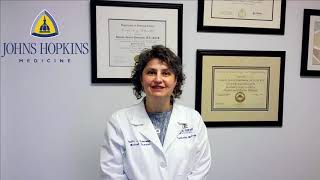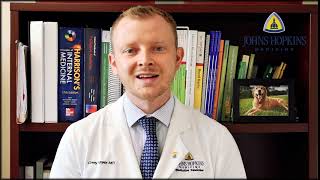Hospice and Palliative Medicine Education
Graduate Medical Education
The Johns Hopkins Hospice and Palliative Medicine (HPM) Fellowship Training Program received initial accreditation from the ACGME in 2012 and continued accreditation in 2015 and 2023. The goal of our program is to train specialist palliative medicine physicians who excel as clinicians, teachers, team members, and leaders. We also hold the goal of developing lifelong learners and catalysts for improving the quality of hospice and palliative medicine across the lifespan and within health systems.
Program Overview
The HPM fellowship program is a 12-month clinical fellowship. The program includes rotations at different facilities, providing a diversity of clinical settings, patient demographics and acuity. Each site has a dedicated HPM Fellowship site director to guide and mentor the fellow through their rotation. Physician faculty members are all specialized in Hospice and Palliative Medicine, and provide clinical supervision and teaching as attending physicians for each of the clinical rotations. Fellows work as members of strong interdisciplinary teams in all settings. Fellows who focus on adult HPM, and those who focus on pediatric HPM, rotate to similar locations. All fellows meet together in a weekly seminar, promoting peer learning from a diversity of training backgrounds.
Welcome from Dr. Corey Tapper
- 12-month clinical fellowship
- Diversity of settings, patient demographics and actuity
- Each site has a dedicated HPM site director
- Physician faculty members are all specialized in HPM
- Fellows work as members of strong interdisciplinary teams
- Adult HPM and Pediatric HPM Fellows rotate to similar locations
-
Weekly Professional Development series and Fellow Didactics (Tuesdays from 2-5PM)
Our program has expanded the educational opportunities in order to more fully espouse the education mission of JHM/JHUSOM. This professional development series will take place on Tuesdays from 2-5PM. There are both Zoom and in-person options for this series. Each Tuesday, two of the three hours will be dedicated to core Palliative Medicine didactic sessions. They are different every week and taught by a variety of disciplines.
- Section of Palliative Medicine Grand Rounds: First Tuesday of every month at 4PM
- Section of Palliative Medicine Journal Club: Second Tuesday of every month
- Care for the Caregiver: Third Tuesday of every month as per ACGME mandate, this is a fellows-only session
- Fellow Case Presentations: Fourth Tuesday of each month
- Annual Palli-Talk Conference (Pittsburgh, PA): Three-day communication skills course taught using vital talk model
- Annual Assembly AAHPM/HPNA
-
- Johns Hopkins Hospital / Johns Hopkins Children’s Center
- Acute inpatient hospital consultation services
- Outpatient clinics
- Johns Hopkins Bayview Medical Center
- Acute inpatient hospital consultation services
- Outpatient clinics
- Gilchrist: Acute inpatient hospice unit and home hospice visits for both peds and adult track fellows
- Gilchrist Center Towson - acute inpatient hospice unit
- Gilchrist Home Hospice Team
- Gilchrist Kids – home hospice + inpatient unit at Gilchrist Center Baltimore
- Palliative consults in long-term care and subacute rehab setting
- Mount Washington Pediatric Hospital: Pediatric rehabilitation hospital
- Kennedy Krieger Institute: Ambulatory pediatric chronic pain clinic
- Electives (some examples listed below)
- Chronic Pain
- Suburban Hospital
- Bridging Life Hospice
- Chapliancy
- Pediatric Pain
- Johns Hopkins Hospital / Johns Hopkins Children’s Center
-
Johns Hopkins Medicine Virtual Tour
Our program is deeply committed to ensuring our fellows learn in a supportive atmosphere that provides exceptional education, mentoring and focuses on wellness. As a HPM fellow at Hopkins, you will be mentored by a dedicated faculty with extraordinary expertise and a unique approach to patient centered care and research in a rich and interdisciplinary program. Our graduates assume leadership positions with great success in academic, research and private settings.
The program has a very flexible vacation policy of four weeks which aims to accommodate those who need to sit for National Board exams. Fellows can use their vacation in one or two-week blocks, but unused vacation time does not carry over to a subsequent academic year, nor are unused days paid out.
We have a robust wellness program and counseling resources, in addition to Mindfulness Sessions that are an excellent resource to manage stress and anxiety.
Our program has a focus of inclusiveness and promotes diversity among faculty, staff and fellows, we provide a safe and welcoming environment for fellows of different cultures, backgrounds, including age, gender, gender identity, ethnicity, nationality, race, religion, sexual orientation and socioeconomic status.
- Johns Hopkins Medicine Office of Diversity, Inclusion and Health Equity: The mission to cultivate all perspectives, comprehend each patient, collaborate with our community and create health equity
- Task Force on Women's Academic Careers in Medicine (TF): The mission of the TF is to promote a culture that ensures the advancement and success of all faculty and fellows by identifying and addressing gender inequity
- White Coats for Black Lives
“Everybody is like somebody,
Everybody is like nobody,
Everybody is like everybody.”
- A Buddhist proverb -
A unique combination of the old and the new, Baltimore is a national showcase for urban renewal and ethnic tradition. The city’s most popular attraction is the Inner Harbor, which includes enclosed food and shopping pavilions, the National Aquarium, the Maryland Science Center, and the acclaimed Oriole Park Baseball Stadium at Camden Yards, as well as the Baltimore Ravens football stadium. Yet, to the native Baltimorean, it is the city’s ethnic neighborhoods and restaurants, row houses with marble steps, and Chesapeake Bay crabs that best describe Baltimore.
Learn more about what Baltimore has to offer here.
-
With a flexible vacation policy of four weeks which aims to accommodate those who need to sit for National Board exams. Fellows can use their vacation in one or two-week blocks, but unused vacation time does not carry over to a subsequent academic year, nor are unused days 'paid. Funding is also available for fellows to attend conferences. GME covers comprehensive medical insurance for all house staff and dependents.
-
Applications are only accepted through ERAS
The Johns Hopkins Hospital
Hospice and Palliative Program
600 N. Wolfe Street, Blalock 359
Baltimore, MD 21287Program Director: Danielle J. Doberman, MD, MPH, HMDC
Associate Program Director, Adult: Corey Tapper, MD, MS
Assistant Program Director, Peds: Melanie Brown, MD, MSE
Assistant Program Director, Hospice: Ivy Akid, MD
Palliative Fellowship Coordinator: Angel Williams ([email protected])
Phone: 410-955-3719
Fax: 410-955-2098
Undergraduate Medical Education
TIME Course
This clinical four-day course is offered twice a year to ensure that every student has the opportunity to complete it before graduation. Students must have completed at least one core clerkship before taking this course in the eighth week of a core clerkship block. The interdisciplinary faculty use a variety of teaching methods including lectures, assigned reading, team-based learning, small group interactions and use of standardized patients. Invited speakers from the community will also participate. HPM fellows serve as teaching assistants and serve as preceptors to simulated patient encounters.
For more information, click here.
3rd - 4th Year Clinical Elective
The elective will provide an introduction to Hospice and Palliative Medicine, the newest and the fastest-growing medical specialty. Over 90% of hospitals now have Palliative Care programs based on the randomized clinical trial evidence that shows better quality of life, better quality of care, lower cost and even improved survival compared to usual care. Communication about serious topics, advanced symptom management, and interdisciplinary care with chaplains, social workers, and advanced practice nurses. Research opportunities into clinical symptom control (dyspnea, pain, neuropathic pain) and quality improvement (measuring and improving care in the hospital) may be arranged upon request. The curriculum will emphasize the evidence base behind Palliative Care.
Clinical experiences may include the following:
- Inpatient consultations at JHH
- Inpatient PC unit rotations at Gilchrist Hospice
- PC outpatient clinic at Skip Viragh Building and Johns Hopkins Outpatient Center
- Home PC visits
Course Type: Clinical Research
Course Director: Danielle Doberman, MD, MPH, HMDC
Availability/Duration: 2-4 weeks
Drop Period: 1 month
Contact Us for More Information
Angel Williams
Sr. Administrative Coordinator/Fellowship Coordinator
600 N. Wolfe St., Blalock 359
Baltimore, MD 21287-0005
Phone: 410-955-3719
Email: [email protected]


